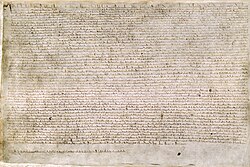Rights
A right is something a person has which people think should not be taken away. It is a rule about what a person is allowed to do or have.[1] A right is different from a privilege, which is something that must be earned.
Rights may be put into laws, so they have legal protection. But a right can exist where most people think it is good (just).
Examples
- Many think people have a "right to life". That means that if one person kills another, the killer would be taking away the victim's "right to life". It also means life should be preserved or guarded when it is threatened in other ways.
- People may also have a "right to property". It means they can own property. It also means people should not steal things from each other.
- In many countries, people have a "right to free speech", which means other people should not stop them from speaking their opinions. Some countries have laws which allow newspapers and television to give opinions. They can speak against their government if they wish to.
- People can defend themselves if other people attack them. That is called self-defense.
Rights Media
Do groups have rights? Some argue that when soldiers bond in combat, the group becomes like an organism in itself and has rights which trump the rights of any individual soldier.
Police officers in the United States are required to read the Miranda warning between making an arrest and beginning an interrogation. The warning informs the person arrested that they have rights included in the Fifth Amendment. Failure to "read Miranda" disqualifies evidence obtained primarily in the questioning.
Magna Carta or "The Great Charter" was one of England's first documents containing commitments by a king to his people to respect certain legal rights. It reduced the power of the monarch.
The Declaration of the Rights of Man and of the Citizen in 1789 in France
References
- ↑ Stanford Encyclopedia of Philosophy. Stanford University. July 9, 2007. http://plato.stanford.edu/entries/rights/. Retrieved 2009-12-21. "Rights dominate most modern understandings of what actions are proper and which institutions are just. Rights structure the forms of our governments, the contents of our laws, and the shape of morality as we perceive it. To accept a set of rights is to approve a distribution of freedom and authority, and so to endorse a certain view of what may, must, and must not be done.".
Related pages
- Civil and political rights
- Constitution
- Constitutional economics
- Human rights
- Rule of law
- Natural rights





